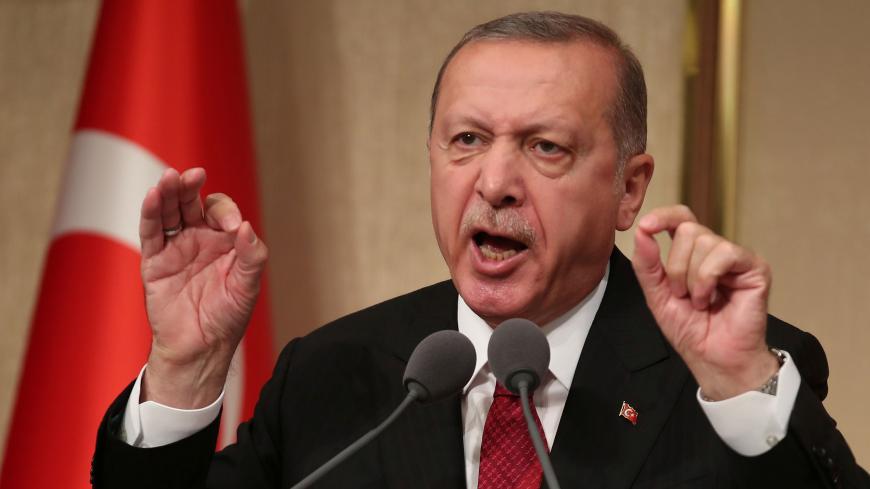The Knesset approved Israel’s new "nationality law" on July 19, upholding the Jewish character of the State of Israel. The controversial law has generated varied reactions inside Israel and abroad. Turkish President Recep Tayyip Erdogan reacted especially harshly.
On the Israeli side, Prime Minister Benjamin Netanyahu’s response to Erdogan's outburst against the new law was relatively mild, although Erdogan’s anti-Israel rhetoric was harsher than usual.
Addressing members of his ruling party in parliament on July 24, Erdogan compared Israel’s actions to those of Nazi Germany. “There is no difference between Hitler’s Aryan race obsession and Israel’s view that all ancient lands belong to Jews only. Hitler’s spirit has re-emerged among certain senior officials in Israel,” he said to wild applause.
Netanyahu responded that Erdogan's criticism is "the greatest compliment,” saying, “Turkey under Erdogan is becoming a dark dictatorship, while Israel is meticulously maintaining equal rights for all its citizens, before and after the law.”
Of course, one may question how Netanyahu can claim that the law is not racist and somehow provides equal rights for all citizens, but his pro forma reaction was probably given to avoid exacerbating tensions with Ankara. Just think, only a decade ago the two countries were allies coordinating their moves in the Middle East, and now they are on the verge of severing diplomatic ties.
Unlike Netanyahu’s measured response, the government’s National Security Council recently determined that Israel could no longer ignore the Turkish president’s harsh rhetoric. The NSC recommended that if Erdogan attacks Israel again, it must respond with actions rather than words. One of the steps it suggested was restricting the activity of the Turkish Cooperation and Coordination Agency (TIKA), whose East Jerusalem office helps Palestinians in the West Bank and Gaza Strip.
Netanyahu appointed Meir Ben-Shabbat as NSC chair almost a year ago, initially as a stand-in and then as a permanent post. He previously headed the southern district of the Shin Bet, acquiring great expertise about events in Gaza. Ben-Shabbat is highly knowledgeable about the Hamas movement that controls Gaza, having headed the agency’s activities during Israel’s Operation Cast Lead against Hamas in late 2008. Ben-Shabbat also serves as the government’s national security adviser and is privy to all the messages conveyed by Hamas via Egypt, including the latest understandings regarding a cessation of hostilities.
Under a 2008 law, the NSC operates in the prime minister’s office under his guidance, dealing with foreign policy and defense issues. Because the head of the NSC also serves as national security adviser, the proposal to hit back at Erdogan over his outspoken attacks and to hurt one of his pet projects comes from the defense agency closest to Netanyahu.
Turkey established TIKA in the early 1990s after the Soviet Union’s collapse as a government agency operating in former Soviet states with sizable Muslim populations. Over time, it expanded its activities to other regions, including the West Bank area under control of the Palestinian Authority and the Gaza Strip. TIKA’s Israel office is located in the predominantly Palestinian East Jerusalem neighborhood of Sheikh Jarah, and it prides itself on running over 500 projects that benefit Palestinians.
TIKA’s biggest project these days is the construction of a Gaza hospital as well as the paving of roads and rehabilitation of the Strip’s collapsing sewage system. With funding from the Turkish government and donations from Muslim charitable foundations, TIKA also promotes smaller projects in the PA. On May 21, Israel Hayom reported that in a bid to buy influence, TIKA was handing out $500 checks to Palestinian merchants in East Jerusalem, in return for which they were told to fly the Turkish flag. Israel believes Erdogan is trying to use TIKA to gain a foothold in Jerusalem’s Al-Aqsa Mosque, to the dismay of Jordan as the holy site’s custodian.
The NSC’s detailed recommendations to restrain TIKA have yet to be reported, and it is not known whether the measures are designed to limit its activity only in East Jerusalem and the PA, or whether it also targets activity in the Gaza Strip and contacts with Hamas. Al-Monitor asked the prime minister’s office to address the NSC proposals but was told the information was confidential.
Ben-Shabbat appears to be toeing the line of the defense echelons, which argue that the humanitarian crisis in the Strip is one of the prime irritants between Hamas and Israel, and that Israel must therefore help alleviate the suffering. Therefore, he is unlikely to suggest restricting projects that improve the situation in Gaza and provide hundreds if not thousands of scarce jobs in the Gaza Strip, which suffers one of the highest unemployment rates in the world.
Even if the recommendations only target the PA and East Jerusalem, it seems likely that the NSC adopted them primarily to get back at Erdogan. After all, it has not suggested immediate action to counter a perceived attempt by Turkey to spread its word in East Jerusalem and the PA under Israel’s nose. The proposal to impose sanctions if Erdogan attacks Israel again proves that the NSC is more interested in revenge against him than it is concerned about TIKA activity in Jerusalem and the PA.
Netanyahu reacted with moderation in the latest clash with Erdogan, but the recommendation of his national security adviser to strike back with actions rather than invective remains on his desk. Will taking steps against the Turkish government’s aid agency stop Erdogan? Ben-Shabbat, an experienced Shin Bet operative, appears to think it will.







